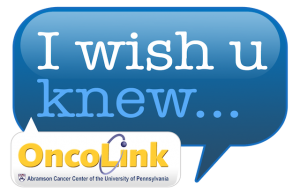As I began to write this piece to tell aspiring nursing students why choosing oncology might be a great choice, I reflected on my own haphazard path into oncology. I guess I’d be lying if I said I choose oncology as a nursing specialty when I finished my BSN. Yes, I had a great experience as a candystriper on an oncology unit in high school. However, the reality was that there were two jobs available at the institution I wanted to work at and they were both in oncology – one in gynecologic oncology and the other in a general medical oncology unit. I chose medical oncology thinking I’d prefer a more diverse experience. I didn’t really expect to love it, just learn some med-surg basics and figure out what I wanted to do with the rest of my nursing career. But I did love it – and still do, almost 20 years later.
Talk to an oncology nurse and they will tell you the rewards of this specialty; the fact that you never leave work thinking did I really make a difference in someone’s life today? You don’t have to ask, you did. They might tell you about the honor you feel holding a dying person’s hand, the way you live your life differently because of the people you’ve met in this profession or the joy you share in when a person finishes treatment. But it’s not for everyone. I started my career on the oncology unit with 13 newly minted nurses and more than half have moved on to other specialty areas. But if it is a right fit for you, you will know.
So, how did I get here? I completed a Bachelor of Science in Nursing and went to work. My positions as a bedside nurse are the ones that meant the most to me – I found them the most rewarding and fulfilling. While a nurse with any degree can specialize in oncology, there has been a trend towards requiring a BSN to practice in many hospitals. Once in an oncology position, you will have training in the administration of oncology medications (chemotherapy, biotherapy, etc.), perhaps learn about the subspecialties of surgical oncology or radiation oncology. Much of this training is done on the job or in courses held at your hospital or other local institutions. Once you have worked and gained some experience, you may want to seek a professional certification from the Oncology Nursing Certification Corporation. Many employers offer higher pay or bonuses to certified nurses.
After working for a number of years, I decided to take advantage of the tuition reimbursement offered by my employer and pursue a Master’s degree. After a lot of hard work and balancing of home, work and school, I received a Master of Science in Nursing and a Nurse Practitioner of Adult Oncology License (see how licensing requirements have changed). My MSN program was a “blended role” Advanced Practice Nurse program, meaning I was prepared to function as a nurse practitioner or a clinical nurse specialist. In the 12 years since, I have worked in a number of positions, including staff development, clinical nurse specialist, adjunct faculty and my current role as OncoLink’s Nurse Educator. One thing I love about nursing in general is the many directions your career can take and the number of ways you can use your knowledge- in both your professional and personal life.
Now that is what it takes on paper to become an oncology nurse. But what does it really take? In a word, heart. You become part of a person’s life during what is quite possibly the most difficult time they have ever experienced. They have started on a journey they did not choose – and you are their guide. If you cannot care for every patient as if they were your family members, then this might not be the place for you. Remember that no person is ever diagnosed alone- this diagnosis affects their spouse or partner, family and friends as well. If you want to hold a patient’s hand through this journey, providing education, treatment, symptom management and sometimes just a listening ear or shoulder to cry on, then join me. Join me on a journey that will provide a lifelong, rewarding career that is sure to change your appreciation for life.
For more insights into the oncology profession, view a few of the I Wish U Knew videos from oncology professionals on their thoughts on working in oncology:
I wish u knew… Caring for people with advanced lung cancer with Vicki Sherry, RN, MSN, CRNP
I wish u knew… providing care at the end of life is a privilege and The honor of being an oncologist with Bruce Giantonio, MD
I wish u knew… how cancer patients have changed my life with James Metz, MD
I wish u knew… the rewards of working in radiation oncology with Christine Hill-Kayser, MD
I wish u knew… the role of the nurse practitioner in oncology with Genny Hollis, MSN, CRNP


Can you navigate me to a person or site that can help me get professional advice from nurses so I can help my 32 yo daughter with advanced stage 3 ductal breast chemo side effects. I am was a CV NP/CNS I no longer practice in that field. and oncology is not my specialty, I need comments on preventing mouth sores which cycle 1 was a real problem and she got significant breast swelling and soreness post chemo day 5. No one seemed to know why, didn’t think an infection but started her on antibiotic??
I just need some peers to talk to and see if my thinking is good. She wants to be independent and not have mom ask too many questions when we see her Drs
Hi Connie- LBBC.org is a great resource as is the Young Survival Coalition (https://www.youngsurvival.org/). Both have support programs, help lines and can connect you with other caregivers. For the mouth sores, some research has shown that sucking on ice chips before and during infusion can help prevent them. Search for cryotherapy for mouth sores to read about that online. Hopefully, the breast swelling won’t happen again, but something to keep an eye on. Maybe you can come to an agreement that mom gets a few questions at every appt 😉 You are just doing what moms do- take care of their babies, no matter how old they are. She’s lucky to have your support.
Hello!
Thanks for this lovely post. Can you provide any thoughts on going into medical oncology vs. surgical oncology as a new grad? I’m choosing between the two units at my hospital (mid-sized teaching hospital). I’ve worked in oncology research for the past 6 years, part of that while pursuing my BSN. I initially thought surgical oncology because I’m interested in wound care, but am now wondering if I’ll miss out on more continuity of care that I assume is provided on the medical oncology floor.
Thank you!
Steph
Steph – there is lots to learn in both units I am sure. I went into med onc out of school and did feel like I missed out on a lot of surgical knowledge. But, people on Surg onc side might say the same about medicine! I did enjoy the continuity and getting to know the families I cared for. We did wound care in med onc, though not to the extent you would in surgery units. And remember, you might work in one area for a year or two and then switch. I started as a new grad with a large group of new to practice nurses – some loved oncology and stayed and others moved on. And they went everywhere- ER, OR/PACU, intensive care and even the neonatal ICU! That’s the great thing about nursing- so many avenues.
Good luck! And maybe you’d like to share your 1st year journey with others 😉 Let me know!